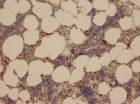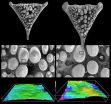Is bioenergy expansion harmful to wildlife?
2012-04-04
(Press-News.org) Despite the predicted environmental benefits of biofuels, converting land to grow bioenergy crops may harm native wildlife. Researchers at the Helmholtz Centre for Environmental Research in Leipzig have developed a way to study the effects of increased energy crop cultivation on farmland bird populations.
"The Skylark is an indicator species for agricultural areas because it occupies many habitats of the wider countryside around the globe, breeds on the ground within fields and feeds mostly on insects" notes lead researcher, Jan Engel. "Improving the habitat suitability for Skylark, accordingly, would improve conservation of natural vegetation, insects, and other ground breeding farmland bird species."
Mr. Engel and his colleagues developed a computer model that evaluated the habitat requirements of Skylark in a variety of bioenergy cultivation scenarios. The study, published in Global Change Biology Bioenergy, found that bioenergy crop expansion will not harm Skylark populations if field sizes are low, many crop types are present, and small natural areas, known as Integrated Biodiversity Areas, are included within the landscape.
"In ecology it is a widely accepted idea that abundance and occurrence of particular species can broadly indicate the condition of the respective ecosystem" says Engel. The recent Skylark population decline illustrates the endangerment of farmland ecosystems. "However, we could show that bioenergy cultivation can get harmonized with Skylark conservation by application of regionally adapted actions."
INFORMATION:
This paper is published in GCB Bioenergy. To request a copy contact GCB-Bioenergy@igb.uiuc.edu or +00 (1) 217-333-9651.
END
ELSE PRESS RELEASES FROM THIS DATE:
2012-04-04
Neutrophil granulocytes comprise important defences for the immune system. When pathogenic bacteria penetrate the body, they are the first on the scene to mobilise other immune cells via signal molecules, thereby containing the risk. To this end, they release serine proteases – enzymes that cut up other proteins to activate signal molecules. Scientists at the Max Planck Institute of Neurobiology in Martinsried have now discovered a new serine protease: neutrophil serine protease 4, or NSP4. This enzyme could provide a new target for the treatment of diseases that involve ...
2012-04-04
A new study has estimated that over 260,000 cats and dogs entered the care of UK rescue organisations during 2009, the first full year since the onset of the UK recession.
The aim of the research was to estimate the number of cats and dogs, currently being cared for by UK welfare organisations, the proportion of time that these organisations were full to capacity and the number entering these organisations during a 12-month period. The University of Bristol study by Dr Corinna Clark and colleagues in the School of Veterinary Sciences is published in the Veterinary ...
2012-04-04
The journal Computers in Biology and Medicine has published an article on the new IT application BootstRatio, created by IDIBELL researchers. The application allows online statistical analysis of data from gene expression. It is accessible through http://regstattools.net/br and any scientist is already to use it.
Researchers at the Human Molecular Genetics group at IDIBELL, led by Dr. Virginia Nunes, had a problem to provide signification to the results of statistical analyses of gene expression data. Most of the statistical calculations which are done to compare gene ...
2012-04-04
You are what you eat is truism that has been given new impetus by 'cutting edge' research led by the University of Leicester that reveals your teeth are literally shaped by your food.
Indeed, evidence from teeth can be used to determine what has been eaten by an animal providing a new way of working out the diets of wild animals that doesn't involve the unpleasant task of looking at the contents of their guts.
Scientists say it is also possible to use these methods to investigate diets of extinct animals such as giant marine reptiles and dinosaurs.
Research led by ...
2012-04-04
Negative thinking is a red flag for clinical depression. Stopping such thoughts early on can save millions of people from mental illness, according research study from the Frances Payne Bolton School of Nursing at Case Western Reserve University.
Jaclene Zauszniewski, the Kate Hanna Harvey Professor in Community Health Nursing and associate dean for doctoral education at the school, has developed a brief 8-item survey to help healthcare providers identify depressive thinking patterns that may lead to serious depression if not identified and addressed early.
Zauszniewski's ...
2012-04-04
Soon, the gardens and fields will be blooming, fragrant and buzzing again. Bees, flies and beetles fly, as they have done for millions of years, from flower to flower in search of food or mates, drawn by flower shapes, colors and the scents of the individual plants. Often, pollinating insects favor certain scents and preferentially visit the flowers in question. Previously, researchers always assumed that floral scents and the fondness of pollinating insects for a specific scent evolved mutually via coevolution of plants and insects. However, the evolutionary biologist ...
2012-04-04
Physicists have recently devised a new method for handling the effect of the interplay between vibrations and electrons on electronic transport. Their paper is about to be published in EPJ B¹. This study, led by scientists from Zhejiang University, Hangzhou, China, and the Centre for Computational Science and Engineering at the National University of Singapore, could have implications for quantum computers due to improvements in the transport of discrete amounts of information, known as qubits, that are encoded in electrons.
The authors created an electron transport model ...
2012-04-04
A current study shows that the risk for coronary heart disease and stroke increases by almost thirty per cent in a person whose partner has cancer. The cause is probably the negative stress to which the cancer patient's relative is exposed.
We know that the relatives of chronically ill patients, especially cancer patients, have an increased risk of mental illness and depression. Previous studies have reported that mental stress and depression affect the nervous system, blood pressure and inflammation, which in turn can increase the risk of developing coronary heart disease ...
2012-04-04
Philadelphia, PA, April 3, 2012 – Depressed individuals with a tendency to ruminate on negative thoughts, i.e. to repeatedly think about particular negative thoughts or memories, show different patterns of brain network activation compared to healthy individuals, report scientists of a new study in Biological Psychiatry.
The risk for depression is increased in individuals with a tendency towards negative ruminations, but patterns of autobiographic memory also may be predictive of depression.
When asked to recall specific events, some individuals have a tendency to ...
2012-04-04
Alexandria, VA – Tornadoes are notoriously difficult to forecast, with often deadly results: In 2011, tornadoes in the U.S. killed more than 550 people, a higher death toll than in the past 10 years combined. Now a new study on short-term climate trends offers a fresh approach to tornado forecasting that may give people in tornado-prone regions more warning that twisters may soon be descending.
By sorting through average atmospheric conditions in tornado-prone regions, Michael Tippet, a climate scientist at Columbia University, may have found a way to predict tornado ...
LAST 30 PRESS RELEASES:
[Press-News.org] Is bioenergy expansion harmful to wildlife?


